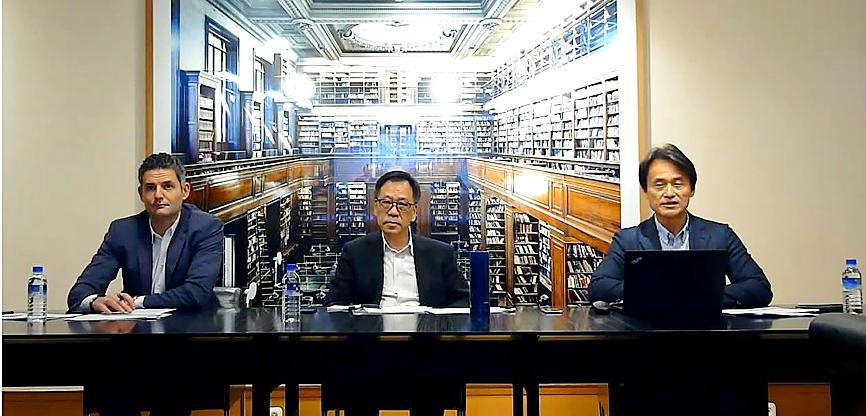Passive components maker Yageo Corp (國巨) yesterday said revenue would be flat or grow modestly this quarter amid steady market demand, ending three straight quarters of declines.
Yageo’s revenue has dropped for three straight quarters amid sluggish demand and excessive inventory.
In the first quarter of this year, revenue contracted 9.5 percent quarter-on-quarter and 13.4 percent year-on-year to NT$26.1 billion (US$852.6 million), while net income shrank 0.8 percent quarterly and 33.8 percent annually to NT$4.13 billion, the company said.

Photo: Chang Hui-wen, Taipei Times
Yageo CEO David Wang (王淡如) said revenue would stop falling this quarter and likely be flat or increase slightly from last quarter.
“Hopefully, this will be a good sign,” he told an online investors’ conference in Taipei. “Visibility is not clear yet, but the second half of the year is usually a high season and will be slightly higher than the first half.”
Gross margin would improve slightly from 33 percent in the first quarter, primarily due to cost management and a better product portfolio, he said.
Yageo’s gross margin has fallen since it posted 38.8 percent in the second quarter of last year.
The average selling prices of Yageo products is expected to be stable this quarter, it said.
INVENTORY WOES
Yageo executive vice president of global sales and marketing Claudio Lollini said the firm’s inventory level remains quite high, particularly at global distributors, even though the situation is slightly better in China.
Demand for passive components used in smartphones and laptop computers has not returned to the pre-slump level, Lollini said, but added that Yageo continues to see encouraging signs from the industrial and automotive segments.
Components for the two segments were the biggest revenue sources last quarter, contributing 23 percent and 31 percent respectively.
Factory utilization would hold steady at 70 percent for its premium products this quarter, Wang said, adding that utilization for its commodity products would be unchanged at 40 to 50 percent.
Premium passive components, including multilayer ceramic capacitors, contributed 75 percent to Yageo’s total revenue last quarter, with commodity components making up the remaining 25 percent.

UNCERTAINTY: Innolux activated a stringent supply chain management mechanism, as it did during the COVID-19 pandemic, to ensure optimal inventory levels for customers Flat-panel display makers AUO Corp (友達) and Innolux Corp (群創) yesterday said that about 12 to 20 percent of their display business is at risk of potential US tariffs and that they would relocate production or shipment destinations to mitigate the levies’ effects. US tariffs would have a direct impact of US$200 million on AUO’s revenue, company chairman Paul Peng (彭雙浪) told reporters on the sidelines of the Touch Taiwan trade show in Taipei yesterday. That would make up about 12 percent of the company’s overall revenue. To cope with the tariff uncertainty, AUO plans to allocate its production to manufacturing facilities in

TAKING STOCK: A Taiwanese cookware firm in Vietnam urged customers to assess inventory or place orders early so shipments can reach the US while tariffs are paused Taiwanese businesses in Vietnam are exploring alternatives after the White House imposed a 46 percent import duty on Vietnamese goods, following US President Donald Trump’s announcement of “reciprocal” tariffs on the US’ trading partners. Lo Shih-liang (羅世良), chairman of Brico Industry Co (裕茂工業), a Taiwanese company that manufactures cast iron cookware and stove components in Vietnam, said that more than 40 percent of his business was tied to the US market, describing the constant US policy shifts as an emotional roller coaster. “I work during the day and stay up all night watching the news. I’ve been following US news until 3am

COLLABORATION: Given Taiwan’s key position in global supply chains, the US firm is discussing strategies with local partners and clients to deal with global uncertainties Advanced Micro Devices Inc (AMD) yesterday said it is meeting with local ecosystem partners, including Taiwan Semiconductor Manufacturing Co (TSMC, 台積電), to discuss strategies, including long-term manufacturing, to navigate uncertainties such as US tariffs, as Taiwan occupies an important position in global supply chains. AMD chief executive officer Lisa Su (蘇姿丰) told reporters that Taiwan is an important part of the chip designer’s ecosystem and she is discussing with partners and customers in Taiwan to forge strong collaborations on different areas during this critical period. AMD has just become the first artificial-intelligence (AI) server chip customer of TSMC to utilize its advanced

Six years ago, LVMH’s billionaire CEO Bernard Arnault and US President Donald Trump cut the blue ribbon on a factory in rural Texas that would make designer handbags for Louis Vuitton, one of the world’s best-known luxury brands. However, since the high-profile opening, the factory has faced a host of problems limiting production, 11 former Louis Vuitton employees said. The site has consistently ranked among the worst-performing for Louis Vuitton globally, “significantly” underperforming other facilities, said three former Louis Vuitton workers and a senior industry source, who cited internal rankings shared with staff. The plant’s problems — which have not